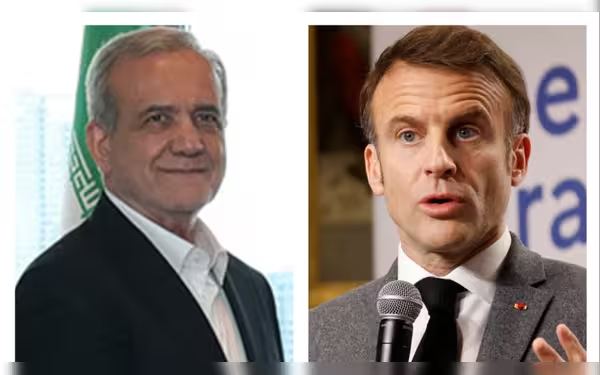Saturday, November 16, 2024 07:30 PM
Macron Meets Iranian President Pezeshkian Over Lebanon Crisis
- Macron urges Iran to de-escalate Lebanon tensions.
- Pezeshkian claims Israel is the aggressor in the conflict.
- Discussions include Iran's missile support to Russia.
 Image Credits: arabnewspk
Image Credits: arabnewspkMacron meets Iranian President Pezeshkian to address Lebanon crisis and regional tensions amid ongoing geopolitical challenges.
In a world where geopolitical tensions often escalate into conflicts, the recent meeting between French President Emmanuel Macron and Iran's new president, Masoud Pezeshkian, comes at a critical time. The backdrop of this encounter is the ongoing crisis in Lebanon, where Israel has intensified its military actions against Hezbollah, a group backed by Iran. This situation has raised alarms not only in the region but also among global powers, prompting calls for de-escalation and dialogue.
During the annual United Nations General Assembly, Macron took the opportunity to urge Pezeshkian to leverage Iran's influence to help calm the rising tensions in Lebanon. According to a statement from the Elysee, Macron emphasized the need for Iran to support a general de-escalation and to use its sway over what he termed "destabilizing actors," clearly referring to Hezbollah. This highlights the delicate balance of power in the region and the significant role Iran plays in influencing various militant groups.
Macron's proactive approach is not without precedent. He has previously engaged in discussions with Pezeshkian, particularly as tensions flared between Israel and Hezbollah. Notably, on August 7, Macron urged the Iranian president to refrain from retaliatory actions following the death of Hamas political chief Ismail Haniyeh, who was reportedly killed in an Israeli operation while visiting Tehran. This incident underscores the interconnectedness of various conflicts in the region and the potential for escalation if diplomatic efforts fail.
In a recent statement, Pezeshkian portrayed Israel as the aggressor, suggesting that Iran has shown restraint in its responses, especially after Western nations hinted at progress towards a ceasefire in Gaza. This narrative reflects Iran's position in the ongoing conflict and its desire to be seen as a stabilizing force rather than a provocateur.
Moreover, Macron's discussions with Pezeshkian also touched upon the allegations that Iran has supplied missiles to Russia, which has led to sanctions from European powers targeting air links. Macron's warning against Iran's continued support for Russia's military actions in Ukraine indicates the broader implications of Iran's foreign policy decisions on its relationships with Western nations.
Despite Pezeshkian's self-identification as a moderate, skepticism remains regarding his influence within Iran's political structure, where Supreme Leader Ayatollah Ali Khamenei holds ultimate authority. This skepticism is echoed by the United States, which has expressed doubts about the potential for meaningful dialogue with Pezeshkian.
In addition to discussing regional tensions, Macron also raised the issue of three French nationals currently imprisoned in Iran, highlighting the human aspect of international relations that often gets overshadowed by political maneuvering.
As the world watches these developments unfold, it is clear that the situation in Lebanon and the broader Middle East remains precarious. The meeting between Macron and Pezeshkian serves as a reminder of the importance of diplomacy in addressing conflicts. While the path to peace is fraught with challenges, open dialogue and a commitment to understanding each other's perspectives may pave the way for a more stable future in the region.













